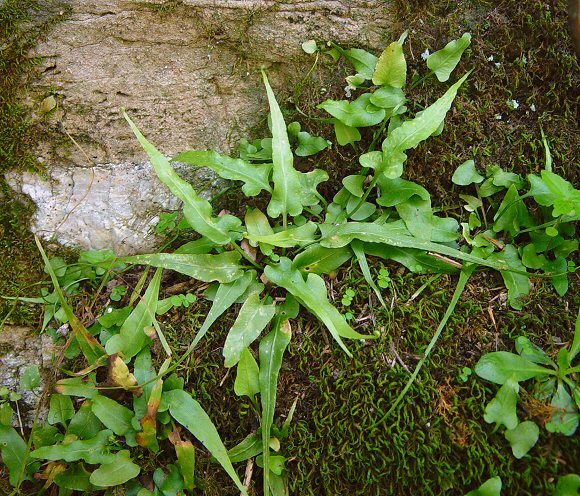Asplenium rhizophyllum L.
Walking Fern

Native
CC = 7
CW = 5
MOC = 76
© DETenaglia
Asplenium rhizophyllum L.Walking Fern | |
 |
Native CC = 7 CW = 5 MOC = 76 |
© DETenaglia |
|
Family - Aspleniaceae Habit - Perennial, homosporous, rhizomatous.
Stems - Rhizomes erect to short-creeping, compact, scaly, the scales clathrate (the endwalls colored, the centers transparent or nearly so). Leaves - Monomorphic, 5-40 cm long. Petioles brown at the base, green above, not shiny. Leaf blades simple, rarely forking at the tip, narrowly deltoid in outline, the tip long-attenuate, often rooting and forming plantlets vegetatively, the base with a pair of auricles, these rounded to long-attenuate. Veins anastomosing. Inflorescence - Sporangia aggregated into sori on the undersurface of the leaf blades, extending along the veins, the indusium membranous, attached along 1 side. Spores 64 per sporangium, monolete, 25-60 ?m long, black. Gametophytes green, flat, heart-shaped to kidney-shaped, often with stalked glands. Flowers - No flowers, plants reproducing by spores.
Flowering - Spores produced May - October. Habitat - Ledges and crevices on dolomite or limestone bluffs, boulders of shaded slopes. Origin - Native to the U.S. Lookalikes - None. Other info. - This attractive fern can be found throughout most of Missouri, and into New England and Canada. The plant is very easy to identify because of its long-tapering leaves which root at the tips and give rise to new plants. This unusual mode of propagation gave rise to the common name "Walking Fern." It is known to hybridize with other members of the Asplenium genus, providing strong evidence for its proper inclusion in the genus. Photographs taken near Spout Spring, Carter County, MO., 6-22-03 (DETenaglia); also at Glassberg Conservation Area, Jefferson County, MO, 8-5-2020, and Roaring River State Park, Barry County, MO, 4-2-2021 (SRTurner). |